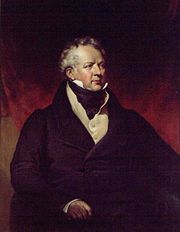
Francis Gore
Encyclopedia

United Kingdom
The United Kingdom of Great Britain and Northern IrelandIn the United Kingdom and Dependencies, other languages have been officially recognised as legitimate autochthonous languages under the European Charter for Regional or Minority Languages...
officer and British colonial
British Empire
The British Empire comprised the dominions, colonies, protectorates, mandates and other territories ruled or administered by the United Kingdom. It originated with the overseas colonies and trading posts established by England in the late 16th and early 17th centuries. At its height, it was the...
administrator.
Gore was commissioned into the 44th Foot in 1787, but transferred to the 54th Foot in 1794 and the 17th Light Dragoons in 1795. He retired with the rank of major
Major
Major is a rank of commissioned officer, with corresponding ranks existing in almost every military in the world.When used unhyphenated, in conjunction with no other indicator of rank, the term refers to the rank just senior to that of an Army captain and just below the rank of lieutenant colonel. ...
and then became Lieutenant-Governor of Upper Canada from 1806 to 1811. Gore's administration built roads, reorganised the militia
Militia
The term militia is commonly used today to refer to a military force composed of ordinary citizens to provide defense, emergency law enforcement, or paramilitary service, in times of emergency without being paid a regular salary or committed to a fixed term of service. It is a polyseme with...
and founded schools.
He was absent on leave during the War of 1812
War of 1812
The War of 1812 was a military conflict fought between the forces of the United States of America and those of the British Empire. The Americans declared war in 1812 for several reasons, including trade restrictions because of Britain's ongoing war with France, impressment of American merchant...
as military authorities ran the province. His stand-in during this time was Isaac Brock
Isaac Brock
Major-General Sir Isaac Brock KB was a British Army officer and administrator. Brock was assigned to Canada in 1802. Despite facing desertions and near-mutinies, he commanded his regiment in Upper Canada successfully for many years...
, who "sought an active role in the impending war as keenly as Gore sought to escape it". Gore resumed his role as lieutenant-governor from 1815 to 1817. During his second term, Gore prorogued the Legislative Assembly
Legislative Assembly of Upper Canada
The Legislative Assembly of Upper Canada was created by the Constitutional Act of 1791. It was the elected legislature for the province of Upper Canada and functioned as the province's lower house in the Parliament of Upper Canada...
after it challenged his ban on issuing land grants to American refugees and made other criticisms of his administration. Robert MacIntosh, in his book Earliest Toronto, describes Gore as "a man who was clearly the most incompetent and disliked Lieutenant Governor in the history of Upper Canada".
Gore Vale, a north-south street on the eastern boundary of Trinity Bellwoods Park
Trinity Bellwoods Park
Trinity Bellwoods Park is located on the west side of downtown Toronto, Ontario Canada, bordered by Queen Street West on the south and Dundas Street on the north. The western boundary of the park is Crawford Street, running north to within a short block of Dundas, where the park extends further...
on the west side of downtown Toronto, is named after him.
Gore left Canada after his posting in 1817 and died in Brighton, England in 1852.

